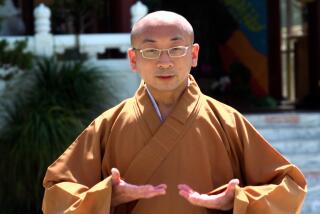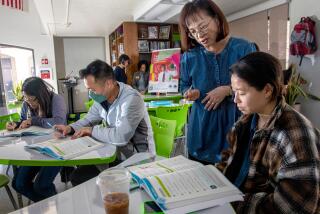State Gives Permission to Buddhist Temple to Grant Academic Degrees : Education: Buddhist leaders want to promote a cultural exchange between the East and West and contribute to world peace.
Hsi Lai Temple in Hacienda Heights, the largest Buddhist monastery in the Western Hemisphere, will begin offering bachelor’s and master’s degrees next year, becoming one of a handful of Buddhist organizations licensed by the state to confer college degrees.
State education officials earlier this month gave permission to the 2-year-old temple to open a private school that will grant bachelor’s degrees in Buddhist studies and master’s degrees in religious studies. The temple is a branch of Fo Kuang Shan, Taiwan’s largest Buddhist organization.
The school will open next spring with from 50 to 100 students, 10 faculty members, and a handful of advisers, said Venerable Yung Kai, a nun at the temple who is serving as acting academic affairs officer.
It will be run out of the Hacienda Heights temple at first. Eventually, the Buddhists plan to open a full-fledged university at another location that will teach a wider range of subjects, including philosophy, business management and humanities, she said.
Through teachings, which will be in English, the Buddhist leaders want to promote “a cultural exchange between the East and West,” Yung Kai said. “Hopefully, we will contribute to world peace.”
The United States was not the first choice of temple officials. Originally, they wanted the school close to the Fo Kuang Shan temple in Taiwan, which is 10 times the size of the Hacienda Heights temple. But that idea met with resistance from the Taiwanese government, which Yung Kai termed “very restrictive” when it comes to licensing colleges run by religious organizations.
There are Buddhist colleges in Taiwan, but none are government-approved, she said.
So after the Hacienda Heights temple opened in 1988, the Venerable Hsing Yun, Fo Kuang Shan’s leader, turned his attention from Taiwan to Southern California. The area is a prime location for a university campus, Yung Kai said, because it can draw on the expertise of American Buddhist scholars.
One such scholar is Lewis Lancaster, a UC Berkeley professor in the department of Oriental languages who is serving as an adviser to Hsi Lai Temple. He said he may teach at the new school as a visiting lecturer. Lancaster also is heading a Fo Kuang Shan project to record Buddhist scriptures on compact disc so they can be viewed on a computer screen.
Lancaster said that although a Buddhist college here is akin to Catholic or Protestant schools in China, it may seem strange to Americans that “a Buddhist group comes into our environment and offers this kind of instruction. I think it’s wonderful. It’s time for all of us to realize we do live in a global environment.”
Hsi Lai Temple, with its glistening tile roofs, traditional Chinese pagoda-style architecture and towering, brightly painted statues, has become something of an American tourist attraction as well as a solemn retreat for the East San Gabriel Valley’s burgeoning Asian population.
The 10-building, 15-acre complex is one of about 50 temples that Fo Kuang Shan owns around the world. The Buddhist organization is planning to break ground soon on another temple in Sydney, Australia.
More to Read
Sign up for Essential California
The most important California stories and recommendations in your inbox every morning.
You may occasionally receive promotional content from the Los Angeles Times.










